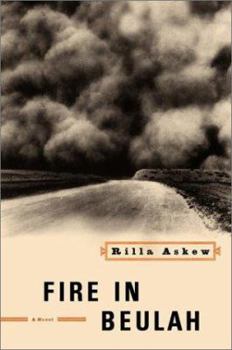Fire in Beulah
Select Format
Select Condition 
Book Overview
"A haunting, engrossing portrait of two families - one white, one Black - whose lives are woven together and then shattered" (The Washington Post) by the 1921 Tulsa Race MassacreOil-boom opulence,... This description may be from another edition of this product.
Format:Hardcover
Language:English
ISBN:0670888435
ISBN13:9780670888436
Release Date:January 2001
Publisher:Viking Books
Length:352 Pages
Weight:1.50 lbs.
Dimensions:1.2" x 6.3" x 9.3"
Related Subjects
Contemporary Fiction Genre Fiction Historical Literary Literature & Fiction Short StoriesCustomer Reviews
5 ratings
Wonderful Read
Published by Thriftbooks.com User , 15 years ago
If you are fortunate enough to come across Rilla Askew's gem "Fire in Beulah," read it. It's absolutely exquisite. Although I initially had trouble getting into the book, once I read a few chapters, I was hooked and read this beautitul story into the wee hours of the night, crying towards the end with outrage and pure amazement. This is a story that needed to be told, and Rilla is the perfect person to tell it. Very few writers can evoke the type of rage, delirium, and palpable sense of emotion that she seems to convey effortlessly. Plus, I always enjoy descriptive writing and in "Fire in Beulah," I felt like I could see everything as if it were playing right before my eyes. A really great, great book.
Authentic, searing portrait of injustice in my hometown
Published by Thriftbooks.com User , 17 years ago
As a white male Tulsan, this book illuminated for me the deep, corrupting injustice of racism and sexism that I'd heard dimly but never really understood about my adopted hometown. I suppose a story about racism and sexism could be told of any Southern city in the Roaring 20s. But Askew's story is uniquely about Tulsa, with its oil-and-water mix of outlaw wildcatters and new-rich oil barons, prosperous blacks and half-Indian Freedmen, and decent God-fearing women and redneck Okies. Askew brings this rich, disturbing portrait to life through the eyes of a Southern belle hiding from her "cracker" past, and a "good darkie" simmering with repressed rage at the cruelty in her life. If those labels offend you, beware; Askew's language is much more vile, reflecting the accepted bigotry of the times. This book is required reading at my son's high school, Booker T. Washington; now I know why.
A snapshot of a shockingly bad era in our history
Published by Thriftbooks.com User , 19 years ago
This functional account of life in the early 20th century in Oklahoma follows two families, one African-American and the other, White European descent. The story climaxes in the relatively unknown Tulsa Race Riot of 1921. Some of the characters are a bit characaturish, such as the neurotic social-climbing-try-to-forget-my-dirt-poor-roots wife, the oil barron wannabe, and the evil Japheth. But they do not ruin the story. If this were pure fiction, I might not give it 5 stars, but as a piece of historical fiction, I do. The treatment of African-American's in the story and in the events upon which it is based is downright grim. Does this reflect reality? I honestly do not know, but I suspect that it does. And that bothers me a lot. I do not think any book has ever lead me to consider the (mis)treatment of African-American's in the United State more than this one. While it is impossible for me to EVER fully understand how someone else feels, I feel that I understand a bit more than I did before I read this book. My recommendation: Read this book.
Well defined characters in a good story, good history
Published by Thriftbooks.com User , 22 years ago
Too little is written about the 1921 Tulsa Massacre, one of the horrendous race wars of the early 20th century. Rilla Askew uses it for the climactic scenes of "Fire in Beulah." That alone stands as a strong selling point for a novel. "Fire in Beulah" is the study of two women,one white and one black, living with social outrages of Jim Crow. Althea and Graceful are memorable characters that could carry a book by themselves. But Askew clearly defines the supporting cast, including rich oil men, a half black-half Indian mid wife, and criminals both black and white.Althea is the wealthy white woman and Graceful her live in maid. One tries to maintain strong family ties, the other has spent a lifetime trying to forget family.The voices are believable, the historical backdrop well-researched and pacing (difficult in such a story) excellent.Also, Askew manages to avoid cliches and writes a story that is always unpredicatable.My only minor quarrel is that some elements of the story are not fully realized. Certain plot lines are never explained. Still, this did not detract from my overall enjoyment of the book.
Compelling, Chilling Historical Fiction
Published by Thriftbooks.com User , 23 years ago
Tulsa, Oklahoma, 1920. Althea Whiteside Dedmeyer, the young wife of an oilman, uneasily co-exists in her household with a black servant named Graceful. Althea has a past that she has hidden from her husband Franklin and there is something about Graceful that provokes her. Then one day, a young black boy comes to the Dedmeyer house with a note addressed to Graceful Whiteside. What follows is a chilling account of racial strife and greed over oil strikes.Althea's past is exposed by a mysterious stranger who whips up turmoil everywhere he goes, ruining Franklin's attempt to sink a new oil well, goading a white mob into lynching and worse. Rilla Askew has a marvelous literary style that brings the 1921 Tulsa race riot painfully back to life. In doing so, she holds tenaciously to the racial views of the time, which can make for uncomfortable reading today. The characters do not experience sudden epiphanies of racial tolerance; there is no feel-good ending. But at that time and place, there couldn't be, and Askew is to be commended for a wonderful merging of literary writing with history.






